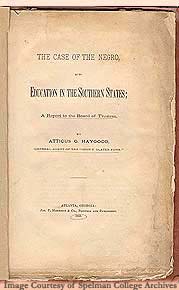Doing Archival Research
by Ed Hullender
As a student and a teacher of history, I know firsthand the joys and the trials of historical research. For the historical researcher, library archival work offers a true window into the historical past and a chance to hear voices from the past. Nothing can stir the passion of an historian more than untapped and un-researched archives waiting for someone to unleash a truly powerful and illuminating story.
Our team's visit to the Spelman College archive offered an interesting example of this principle. The story of Spelman College is a truly magnificent one. It is a story of dedicated and courageous people--both black and white--setting up a school for African American women in the segregated society of the American South after the Civil War. This story can be found in the pages of the Spelman Messenger, a publication that began in the early days of the college.
Reading these early publications, a researcher can get a sense of the struggles and the triumphs of the African American women at Spelman. More importantly this material can give today's student a chance to read, study, and make historical judgments about Spelman and the lives of the people in the American South in the decades after the Civil War. As a teacher and an historical researcher, I know the value of using these documents. That does not alter the fact that gathering these documents is a time- consuming and often frustrating effort. But the rewards of learning through primary documents make the effort worthwhile.
As a teacher then, do I believe historical research is a valid and fruitful enterprise for classroom work? The answer is unequivocally "yes." I believe the researcher/teacher must have plenty of time to collect historical remembrances and reflect on how these documents can best be used by a relatively untrained and unsophisticated student population. Good historical teaching is about connecting with the past. Using historical documents affords all of us the opportunity to delve into the past in a meaningful and positive way.
Click Here for additional notes on the development of this material
Creating a New Context for Studying African Americans' Post-Civil War Education
by Sarah Robbins
A Timeline of Spelman College's Early History
by Ed Hullender
Father Quarles and Aunt Ruth: Leaders for Spelman and All of Georgia
by Deborah Mitchell
Early Graduates: Writers and Community Leaders
Transcriptions from the Spelman Messenger
Reflections on Writing (from) an Oral History
by Deborah Mitchell
Bibliography
by the "Educating for Citizenship" Team
Content Design/Management: Traci Blanchard and Marty Lamers
Home | Curricular
Program | Thematic Content
Classroom Resources
| Community Projects |
Who We Are
© 2000-2001KCAC
No materials on this website should be copied or distributed
(except for classroom use) without written permissions from KCAC.
Questions? Comments? Contact KSU webmaster
Jim Cope.


